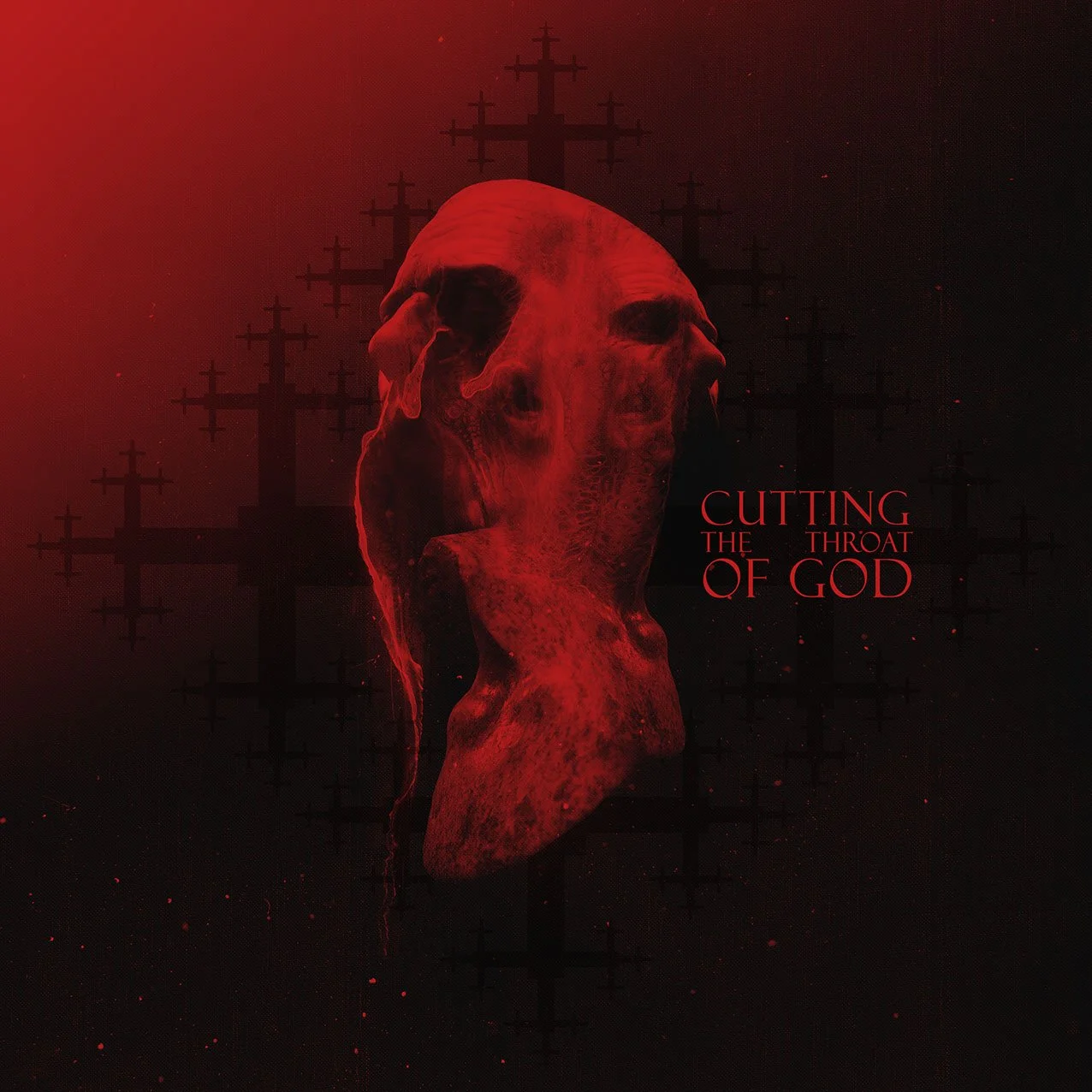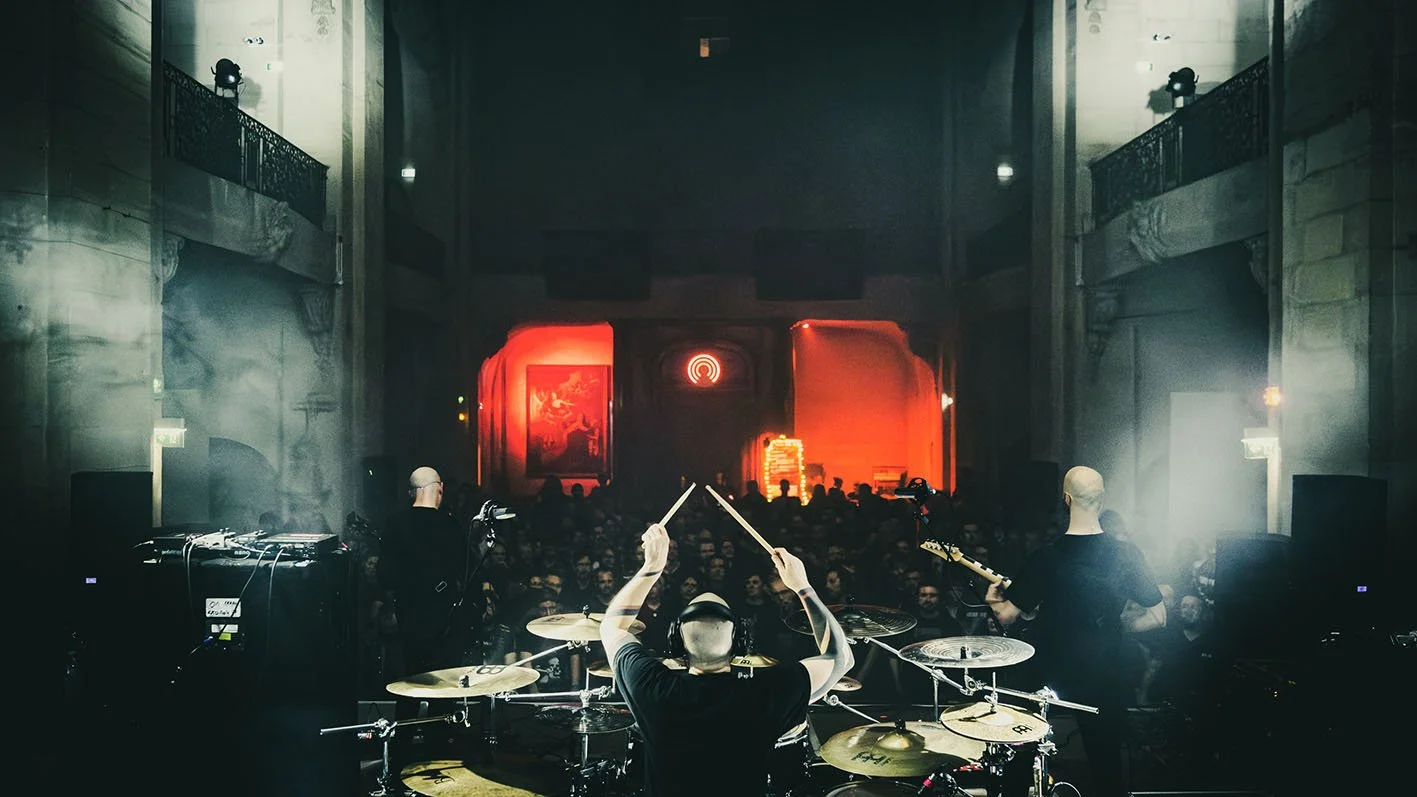
“In this day and age of bedroom Youtube solo superstars, AI slop, and ‘session’ players, I think that being able to experience a collective presenting the art that they actually created and care deeply about, resonates more than ever.”
ULCERATE
———————————
EXCLUSIVE INTERVIEW (2025)
———————————
Having already been active for an impressive quarter century, it’s encouraging to see the crushing and dizzying death metal of Ulcerate striking such a chord with extreme metal fans in recent years. Far from being the most accessible of bands, the New Zealand outfit specialises in songs that are as weighty emotionally as they are musically, skilfully balancing dissonance, aggression and atmosphere to create an undeniably intense and immersive experience.
The effectiveness of such an approach is underlined by the 2024 album Cutting the Throat of God, the band’s seventh record and arguably strongest to date. Epic and apocalyptic, it embodies an impressive degree of technicality throughout, not least in its use of detailed percussion, while – perhaps unusually for technical death metal – also making effective use of space and contrast to increase the dynamic impact. Cult Never Dies caught up with drummer and co-founder Jamie Saint Merat to discuss the band’s recent successes as well as their appearance at the UK’s Fortress festival.
[Shop for Ulcerate at our main store by clicking HERE]
Cult Never Dies: Greetings! First of all, congratulations on Cutting the Throat of God, it has been incredibly well received and seems to have won the band a lot of new fans and attention. Why do you think this record made such an impact, and do you feel it has changed your profile and career?
Jamie Saint Merat: “We’ve definitely felt the reception, and I’d be lying if I didn’t say it’s been very gratifying and humbling to experience. We recalibrated our sonic approach with [previous album] Stare Into Death and Be Still, and for whatever reason, that has also realigned our sound for our fanbase – it really feels that by ‘improving’ things for ourselves, we’ve accidentally done the same for the band’s audience. We made a conscious effort to really write music that prioritises power and emotion over obfuscation. This obfuscation had always been a prior motivator for us – an exercise in density, chaos and claustrophobia. But, over time, this became extremely fatiguing to us. So we just honed in on the elements of our sound that we really enjoyed (enormity, a unique sense of melody, the interplay between the three of us as individuals, the rhythmic interplay, etc) and pushed everything to 10.”
“In terms of profile, ‘career’ is an interesting word for us, as we don’t do this band 100% professionally – we don’t live off the band – so we’re not motivated by commercial decisions at all. Any growth in this sense is nice, but absolutely not the be-all and end-all; it just gives us a little more freedom to take on bigger opportunities, with less risk. Ultimately, we’re extremely cautious around ensuring we protect our creative freedom at all costs.”
You’ve mentioned in previous interviews that it is important to Ulcerate that the concept of death remains paramount within your music. Is this still accurate, and could you elaborate on that a bit in terms of how it shapes your concepts and lyrics?
“For us, it’s always been less about the physical act and more about the relationship between the living and the infinite, the profundity of the human limitation. Our naivety is a blessing and a curse. This is certainly not a theme that is unique to extreme music, and I’d say we get much more of a subliminal influence from literature and cinema that deals with these themes in a much more fully realised manner. But we know full well that there is a sonic landscape being painted with what we’re producing with the instrumentation, so it must be matched with the vocal delivery – there can’t be any friction between these two. So this sort of relationship, or paradox, of life versus death has manifested itself across all of our albums – and we’ve always taken a fairly solemn stance, the most notable being Stare Into Death.”
“It all falls under our overarching ethos of aiming to create something that will make the listener or participant feel infinitely small or insignificant in the scheme of things. In my opinion, all of my favourite art has this quality, and to induce a sense of awe, and at times an introspective terror, is very profound. Hopefully, we are able to manifest this for anyone remotely interested in what we’re doing.”
Let’s talk about your forthcoming appearance at Fortress festival – how did that booking come about?
“We first heard of the festival in 2023 – the Reaper agency team reached out with an offer for us for the 2024 edition, which unfortunately didn’t synchronise with our tour schedule that year. They tried again a year later, and here we are. Proud to be a part of it.”
This isn’t your first time visiting England – what would you say your relationship to the UK is, both as a band, and as human beings?
“From a touring perspective, the UK has always been very good for us – last year’s London performance was one of the biggest of the entire tour and was an absolute pleasure. As New Zealanders we culturally have a deep affinity for the UK. The European side of our heritage is firmly British in its outlook – language, cuisine, media consumption and of course self-deprecation. And given our age, we were all raised on late 80s/early 90s BBC comedy, which I’m still obsessed with – the Atkinson, Cleese, Ianucci, Fry et al blend of extremely sardonic humour has left an indelible mark. My wife was also born in Oxford, with a lot of her extended family still in the UK. And of course, Bolt Thrower. What else needs to be said?”
How do you go about putting together a setlist?
“For the last round of touring, we made a decision to focus deeply on the Stare Into Death and Be Still and Cutting the Throat of God tracks almost exclusively for one main reason: Stare Into Death… was released on the eve of Covid, which swiftly fucked all our tour bookings for the following two years. So that album was only ever toured as we were finishing Cutting the Throat…. Due to the length of most of the material, our setlists, while clocking in at around 80 minutes, can only comprise up to nine songs maximum. So we’ve essentially broken the time into an even split, with one or two tracks from prior albums.”
Speaking more broadly, what significance do live performances have for Ulcerate at this point?
“Live performance to us is equally important as the studio work. To physically manifest the sound with the correct level of severity and controlled chaos is no easy task, yet when done correctly there is something absolutely fucking magic about it. We still rehearse like maniacs three times a week, and we take this incredibly seriously. In this day and age of bedroom Youtube solo superstars, AI slop, and ‘session’ players in the underground (I have many thoughts on this), I think that being able to experience a collective presenting the art that they actually created and care deeply about, resonates more than ever. Bands with unwavering line-ups are always 1000x stronger than performances that utilise ring-ins – there’s so much more to all of this than merely being able to play what someone else has written.”
“Shows for me contain two very important variables – firstly, the entertainment factor of a great live show cannot be denied, the atmosphere of experiencing an overwhelming amount of volume and sensory overload with a massive crowd experiencing the exact same sensation is a deeply primordial feeling, in much the same way live sports connect with an arena of people. And secondly, and for me most importantly, does the band walk the talk? I’ve seen many, many bands with an extremely hard aesthetic that live, have devolved into a pathetic and uncomfortably insecure clown show. And conversely, I’ve also been absolutely kicked in the face by unexpected performances from certain bands that have forced me to reevaluate their recorded output. Album work sometimes doesn’t quite accurately capture the full energy of a great live band playing together, and there is nothing better than watching said band absolutely decimate live. Playing music live is extraordinarily difficult to pull off, and performances that can straddle the divide between playing ‘well’ and imbuing genuine intensity are few and far between.”
Is it difficult to reproduce your songs live, given the introspective and sometimes multi-layered approach of the material? You’ve talked in the past about specifically wishing to make transcendent and overwhelming music – is it easier to achieve that live or in the studio?
“Both are equally challenging. The studio setting has zero rules, and very much follows a thought process of ‘we’ll figure out how to do this live later on’. But we have many techniques for creating a sound that is all-encompassing in a live setting. This starts with instrument tones and working closely with our sound team, knowing how best to fit things in the spectrum. As I record and mix the albums, I work very closely with our sound engineer to make sure everything can be placed where it needs to be in a live context, even down to drum tuning and cymbal choices which are often slightly different to the album, yet at 100dB will provide maximum impact. As there are only three of us and we hardline refuse to play with backing tracks, guitarist Mike will split his signal with delay for faux-stereo, and employs a lot of live looping and stacking. This combined with the bass tone managing a significant portion of the ‘guitar’ sound via multi-amp tone stacking, and we start to get into the sonic territory of ‘fucking huge’ fairly quickly. It’s death by a thousand cuts, pay attention to every last little detail, and they will coalesce to something enormous.”
Finally, New Zealand bands often discuss the hurdles that the geographical location presents for musicians in terms of touring. Do you feel it has made things more challenging, and how is the scene at home currently?
“Infinitely more challenging. We have no face-to-face networks, the logistical costs of flying a bunch of people to anywhere from here are enormous, the isolation means there can be absolutely zero international weekend festival appearances, and due to the physical size of the country, the ability to develop a tour-ready performance standard is null and void for underground bands. The best you can hope for is perhaps three consecutive dates maximum. So almost everything is stacked against you, and those of us who have made it out just have a level of obsession and drive that is borderline fanatical. But we are now reaping the harvest, so to speak, it’s just been a very, very long-game strategy. But we knew this going in.”
Interview by Dayal Patterson. Live photo by Dylan Gauthier.
Shop for Ulcerate at our main store by clicking HERE




